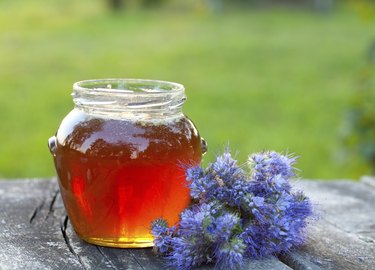
Wildflower honey is made by bees that have collected nectar from a local source of wildflowers. The taste and composition of wildflower honey can vary depending upon the variety of flowers in bloom at the time the honey is made. The potential health benefits of honey are many due to its nutrient rich content and anti-microbial properties.
Cough Suppressant
Video of the Day
Researchers at the Penn State College of Medicine claim that honey may offer more relief to those with an upper respiratory infection and cough than taking an over-the-counter medication containing dextromethorphan, or DM. The Penn State study, published in the December 2007 "Archives of Pediatric and Adolescent Medicine," involved 105 children and their parents separated into three groups. The first group of children was given honey, the second were given a dose of honey flavored DM medication and the third received nothing. The results concluded that the children who had received honey experienced a significant reduction in the severity, frequency and annoyance of their nighttime cough -- more so than the children who received a dose of DM medication. The researchers asserted that honey is an effective and safe alternative to treating an upper respiratory infection and cough in children over the age of 12 months.
Video of the Day
Antioxidants
Antioxidants are powerful immune-boosting compounds found in raw honey. These compounds protect your body from oxidation; a degenerative process that can leave cells damaged and aged beyond their time, according to the University of California-Davis news website. UC-Davis researchers conducted a study to determine the potential health benefits of honey. The researchers enlisted 25 individuals to take 4 tablespoons of honey daily for 29 consecutive days, according to the Medical News Today article, "Honey May Have Sweet Health Benefits." The results of this study showed a marked increase of antioxidants in the participants' blood streams. Researchers concluded that the consumption of honey may offer health benefits by providing antioxidants, compounds linked to increased immune function and protection against conditions like heart disease and cancer, according to the UC-Davis website.
Seasonal Allergies
Some naturalists feel that honey made from the nectar of local wildflowers can relieve you of seasonal allergies. The National Center for Complementary and Alternative Medicine reports that local honey is often eaten by allergy sufferers -- with the belief that it boosts the immune system and acts much like an immunization by building up your body's antibodies to allergens and pollen. While honey does show anti-inflammatory and anti-histamine properties, the NCCAM reports that there is not enough evidence to declare that it is effective against allergies.
- Penn State Live: Honey proves a better option for childhood cough than OTCs
- Archives of Pediatric and Adolescent Medicine: Effect of Honey, Dextromethorphan, and No Treatment on Nocturnal Cough and Sleep Quality for Coughing Children and Their Parents
- Medical News Today: Honey May Have Sweet Health Benefits
- National Center for Complementary and Alternative Medicine: Seasonal Allergies
Is this an emergency? If you are experiencing serious medical symptoms, please see the National Library of Medicine’s list of signs you need emergency medical attention or call 911.